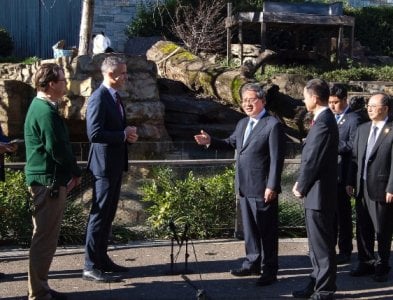Paws for diplomacy: Surprising gesture symbolises warming ties between Australia and China
- Replies 9
In a heartwarming gesture of diplomatic goodwill and cultural exchange, a recent development has sparked excitement in Australia.
This was highlighted by the arrival of a beloved symbol of China's conservation efforts, bringing a smile to wildlife enthusiasts.
This event not only signifies a significant moment in bilateral relations but also captures the imagination of both nations with its promise of fostering cross-cultural understanding through a unique and cherished ambassadorial gift.
Premier Li Qiang revealed that China will be sending a new pair of giant pandas to Australia during a visit to Adelaide Zoo, marking the beginning of his four-day trip Down Under—the first by a Chinese premier in seven years.
The announcement was met with enthusiasm as the zoo prepares to bid farewell to its current beloved pandas, Wang Wang and Fu Ni, who are set to return to China later this year.
The arrival of a new panda pair is not just exciting for animal lovers; it's a diplomatic nod, signalling a thaw in relations that had grown frosty.

Tensions had escalated following calls by former Prime Minister Scott Morrison in 2020 for an international inquiry into the origins of the COVID-19 pandemic, leading to China imposing high tariffs on Australian wines and barriers on other commodities.
However, since the Labor Party's victory in 2022, the diplomatic climate has been changing for the better.
According to the Australian government, China is its largest trading ally and is responsible for approximately one-third of its international trade.
Concurrently, commodities sourced from Australia play a crucial role in supporting Beijing's initiatives to bolster its fluctuating economy.
China's decision to engage in what's affectionately known as ‘panda diplomacy’ was a fascinating aspect of its foreign policy.
For decades, these cuddly creatures have been loaned to over 20 countries as ambassadors of goodwill, often reflecting the strength of China's bilateral relationships.
The presence of giant pandas Wang Wang and Fu Ni—the only pandas in the southern hemisphere—in Adelaide since November 2009 has been a testament to this unique form of diplomacy.
In 2019, their stay was extended for another five years, much to the delight of visitors and the zoo community.
Premier Li, China’s second-highest-ranked official, expressed his satisfaction with the care the pandas received in Australia, noting ‘that though far away from [the] homeland, Wang Wang and Fu Ni have been well looked after and settled down to live a happy life in Australia,’ in a statement from China’s Foreign Ministry.
‘They have become envoys of friendship between China and Australia and a symbol of the profound friendship between the two peoples,’ he added in the statement.
The diplomatic ties between Australia and China, highlighted by significant trade relations and cultural exchanges, have recently been underscored by Premier Li’s announcement, symbolising the strength and intricacy of the bilateral relationship.
As Australia continues to foster connections with other nations, exciting travel opportunities are emerging for Australians.
Notably, a recent policy change has introduced visa-free travel options for Aussies, making it easier for them to explore new destinations without the usual bureaucratic hurdles.
 Have you visited Adelaide Zoo to see the pandas? What do you think about the role of wildlife in international relations? Share your stories and opinions in the comments below.
Have you visited Adelaide Zoo to see the pandas? What do you think about the role of wildlife in international relations? Share your stories and opinions in the comments below.
This was highlighted by the arrival of a beloved symbol of China's conservation efforts, bringing a smile to wildlife enthusiasts.
This event not only signifies a significant moment in bilateral relations but also captures the imagination of both nations with its promise of fostering cross-cultural understanding through a unique and cherished ambassadorial gift.
Premier Li Qiang revealed that China will be sending a new pair of giant pandas to Australia during a visit to Adelaide Zoo, marking the beginning of his four-day trip Down Under—the first by a Chinese premier in seven years.
The announcement was met with enthusiasm as the zoo prepares to bid farewell to its current beloved pandas, Wang Wang and Fu Ni, who are set to return to China later this year.
The arrival of a new panda pair is not just exciting for animal lovers; it's a diplomatic nod, signalling a thaw in relations that had grown frosty.

Premier Li Qiang announced during his visit to Adelaide Zoo that China will send a new pair of giant pandas to Australia as a goodwill gesture to signify warming diplomatic ties. Credit: Instagram / China Xinhua News
Tensions had escalated following calls by former Prime Minister Scott Morrison in 2020 for an international inquiry into the origins of the COVID-19 pandemic, leading to China imposing high tariffs on Australian wines and barriers on other commodities.
However, since the Labor Party's victory in 2022, the diplomatic climate has been changing for the better.
According to the Australian government, China is its largest trading ally and is responsible for approximately one-third of its international trade.
Concurrently, commodities sourced from Australia play a crucial role in supporting Beijing's initiatives to bolster its fluctuating economy.
China's decision to engage in what's affectionately known as ‘panda diplomacy’ was a fascinating aspect of its foreign policy.
For decades, these cuddly creatures have been loaned to over 20 countries as ambassadors of goodwill, often reflecting the strength of China's bilateral relationships.
The presence of giant pandas Wang Wang and Fu Ni—the only pandas in the southern hemisphere—in Adelaide since November 2009 has been a testament to this unique form of diplomacy.
In 2019, their stay was extended for another five years, much to the delight of visitors and the zoo community.
Premier Li, China’s second-highest-ranked official, expressed his satisfaction with the care the pandas received in Australia, noting ‘that though far away from [the] homeland, Wang Wang and Fu Ni have been well looked after and settled down to live a happy life in Australia,’ in a statement from China’s Foreign Ministry.
‘They have become envoys of friendship between China and Australia and a symbol of the profound friendship between the two peoples,’ he added in the statement.
The diplomatic ties between Australia and China, highlighted by significant trade relations and cultural exchanges, have recently been underscored by Premier Li’s announcement, symbolising the strength and intricacy of the bilateral relationship.
As Australia continues to foster connections with other nations, exciting travel opportunities are emerging for Australians.
Notably, a recent policy change has introduced visa-free travel options for Aussies, making it easier for them to explore new destinations without the usual bureaucratic hurdles.
Key Takeaways
- China will provide a new pair of giant pandas to Australia as a gesture of goodwill and to signify warming diplomatic ties.
- Premier Li Qiang announced the panda exchange at Adelaide Zoo during his visit, which was the first by a Chinese premier to Australia in seven years.
- The move followed China lifting tariffs on Australian exports such as wine, barley, timber, and coal, indicating an improvement in bilateral relations.
- The giant pandas are part of China's ‘panda diplomacy’, and the new pair will replace Wang Wang and Fu Ni, who have been in Australia since 2009 and are set to return to China later this year.







